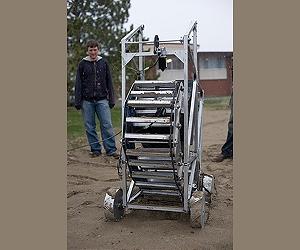F
FictionBecomesFact
Guest
:arrow: Have you signed up for social media advisories regarding your favorites among the potentially growing list of government-sponsored competitive prizes (including NASA's) at http://www.challenge.gov yet?
Meanwhile,what do you think is becoming, and should become of NASA's competitive prizes program?
http://www.CentennialChallenges.nasa.gov
The prizes have all been won (or have expired in one case). Isn't it time for more, and bigger prizes, including for launching? Or should Google's own space prize continue to dwarf that of tax-evading NASA?
http://www.GoogleLunarXPrize.org
Governmental prizes for high tech. breakthroughs are catching on:
http://www.hydrogenprize.org (Dept. of Energy)
http://www.lightingprize.org (Dept. of Energy)
https://networkchallenge.darpa.mil (Defense Department’s DARPA)
http://www.dod.mil/ddre/prize (Defense Dept.)
http://www.darpa.mil/grandchallenge (Defense Department’s DARPA)
http://www.greenaironline.com/news.php?viewStory=225 (FAA)
Why has NASA lost momentum with its prize offerings then? If it's so subjugated to pork-barreling interests, what does that say about whether we should continue supporting NASA?
As a sidenote, this is a great article about prizes' additional progress under the new presidential administration:
http://www.boston.com/news/science/arti ... cognition/
EXCERPT:
“Several politicians have proposed more prizes. Senator Olympia Snowe, a Maine Republican, co-sponsored a bill now in committee to offer cash prizes for innovations in nanotechnology. Senator Bernie Sanders of Vermont is pushing for a government-sponsored prize to encourage medical breakthroughs in areas that do not typically attract enough private industry investment, such as the development of a malaria vaccine.”
Other prizes in the private sector are worth noting:
http://www.mprize.org (immortality, anyone?)
http://www.XPrize.org
PETA’s in vitro meat challenge:
http://www.peta.org/feat_in_vitro_contest.asp
University (Mars) Rover Challenge:
http://www.marssociety.org/portal/c/urc/Teams
Team America Rocketry Challenge:
http://www.rocketcontest.org
http://www.GoogleLunarXPrize.org (mentioned above)
Also:
http://www.innocentive.com : where prize offerors and seekers meet…
http://www.innovationprizecentral.com : list of some additional prizes
http://www.ideaconnection.com/resources ... ntest.html
Shall we settle for the status quo, or finally boldly go?
Meanwhile,what do you think is becoming, and should become of NASA's competitive prizes program?
http://www.CentennialChallenges.nasa.gov
The prizes have all been won (or have expired in one case). Isn't it time for more, and bigger prizes, including for launching? Or should Google's own space prize continue to dwarf that of tax-evading NASA?
http://www.GoogleLunarXPrize.org
Governmental prizes for high tech. breakthroughs are catching on:
http://www.hydrogenprize.org (Dept. of Energy)
http://www.lightingprize.org (Dept. of Energy)
https://networkchallenge.darpa.mil (Defense Department’s DARPA)
http://www.dod.mil/ddre/prize (Defense Dept.)
http://www.darpa.mil/grandchallenge (Defense Department’s DARPA)
http://www.greenaironline.com/news.php?viewStory=225 (FAA)
Why has NASA lost momentum with its prize offerings then? If it's so subjugated to pork-barreling interests, what does that say about whether we should continue supporting NASA?
As a sidenote, this is a great article about prizes' additional progress under the new presidential administration:
http://www.boston.com/news/science/arti ... cognition/
EXCERPT:
“Several politicians have proposed more prizes. Senator Olympia Snowe, a Maine Republican, co-sponsored a bill now in committee to offer cash prizes for innovations in nanotechnology. Senator Bernie Sanders of Vermont is pushing for a government-sponsored prize to encourage medical breakthroughs in areas that do not typically attract enough private industry investment, such as the development of a malaria vaccine.”
Other prizes in the private sector are worth noting:
http://www.mprize.org (immortality, anyone?)
http://www.XPrize.org
PETA’s in vitro meat challenge:
http://www.peta.org/feat_in_vitro_contest.asp
University (Mars) Rover Challenge:
http://www.marssociety.org/portal/c/urc/Teams
Team America Rocketry Challenge:
http://www.rocketcontest.org
http://www.GoogleLunarXPrize.org (mentioned above)
Also:
http://www.innocentive.com : where prize offerors and seekers meet…
http://www.innovationprizecentral.com : list of some additional prizes
http://www.ideaconnection.com/resources ... ntest.html
Shall we settle for the status quo, or finally boldly go?




